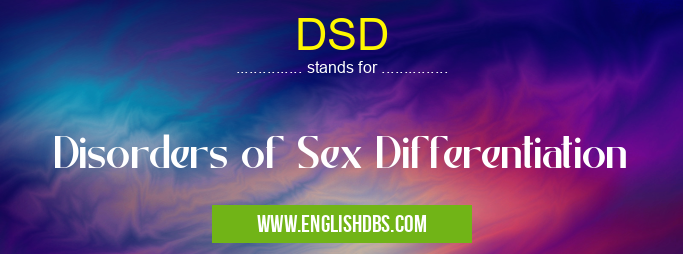What does DSD mean in UNCLASSIFIED
DSD, which stands for Disorders of Sex Differentiation, refers to a group of congenital conditions characterized by the atypical development of chromosomal, gonadal, or anatomical sex. Individuals with DSD may exhibit variations in external genitalia, internal reproductive organs, or sex hormone levels. The diagnosis and management of DSD can be complex and require a multidisciplinary approach involving medical professionals, geneticists, and psychologists.

DSD meaning in Unclassified in Miscellaneous
DSD mostly used in an acronym Unclassified in Category Miscellaneous that means Disorders of Sex Differentiation
Shorthand: DSD,
Full Form: Disorders of Sex Differentiation
For more information of "Disorders of Sex Differentiation", see the section below.
Causes of DSD
DSD can result from various genetic, chromosomal, and hormonal factors, including:
- Chromosomal abnormalities (e.g., Turner syndrome, Klinefelter syndrome)
- Mutations in genes involved in sex development (e.g., SRY, AMH)
- Exposure to certain hormones during pregnancy (e.g., androgens, progestins)
Types of DSD
DSD is classified into several types based on the specific characteristics and underlying causes:
- 46,XX DSD: Individuals with female chromosomes (46,XX) but atypical development of external genitalia or gonads
- 46,XY DSD: Individuals with male chromosomes (46,XY) but incomplete or ambiguous development of external genitalia
- Sex chromosome DSD: Individuals with atypical sex chromosome patterns (e.g., Turner syndrome, Klinefelter syndrome)
- Gonadal DSD: Individuals with atypical development or function of the gonads (ovaries or testes)
Diagnosis and Management
Diagnosing DSD typically involves a thorough medical history, physical examination, and various diagnostic tests such as:
- Chromosomal analysis (karyotype)
- Genetic testing
- Imaging studies (e.g., ultrasound, MRI)
Management of DSD varies depending on the specific condition and individual needs. It may include:
- Hormonal therapy to regulate sex hormone levels
- Surgical intervention to correct anatomical abnormalities
- Psychological support for individuals and families affected by DSD
Essential Questions and Answers on Disorders of Sex Differentiation in "MISCELLANEOUS»UNFILED"
What are Disorders of Sex Differentiation (DSD)?
DSD are a group of conditions that affect the development of sex characteristics, including chromosomes, gonads, and genitalia. Individuals with DSD may have physical characteristics that do not fit the typical definitions of male or female.
What causes DSD?
DSD can be caused by genetic, hormonal, or environmental factors that occur during fetal development. These factors can affect the production or action of hormones, leading to variations in sex development.
How are DSD diagnosed?
Diagnosis of DSD typically involves a combination of physical examination, hormonal testing, genetic analysis, and imaging studies. The evaluation is aimed at determining the underlying cause and identifying the specific type of DSD.
What are the different types of DSD?
There are numerous types of DSD, each with its own unique characteristics. Some common types include:
- Androgen Insensitivity Syndrome
- Congenital Adrenal Hyperplasia
- Klinefelter Syndrome
- Turner Syndrome
- Mixed Gonadal Dysgenesis
Can DSD be treated?
Treatment for DSD depends on the specific condition and the individual's needs. It may involve hormonal therapy, surgery, or a combination of both. The goal of treatment is to optimize physical development, fertility, and overall well-being.
What is the long-term outlook for individuals with DSD?
The prognosis for individuals with DSD varies depending on the specific condition. With appropriate medical care and support, many individuals with DSD can live full and healthy lives.
How can I find support for DSD?
There are various support organizations and resources available for individuals with DSD and their families. These organizations provide information, emotional support, and advocacy to help navigate the challenges and complexities associated with DSD.
Final Words: DSD represents a spectrum of conditions that affect the development of sex characteristics. Understanding the causes, classification, and management of DSD is crucial for healthcare professionals and individuals affected by these conditions. Early diagnosis and appropriate intervention can help improve outcomes and support the well-being of individuals with DSD throughout their lives.
DSD also stands for: |
|
| All stands for DSD |
